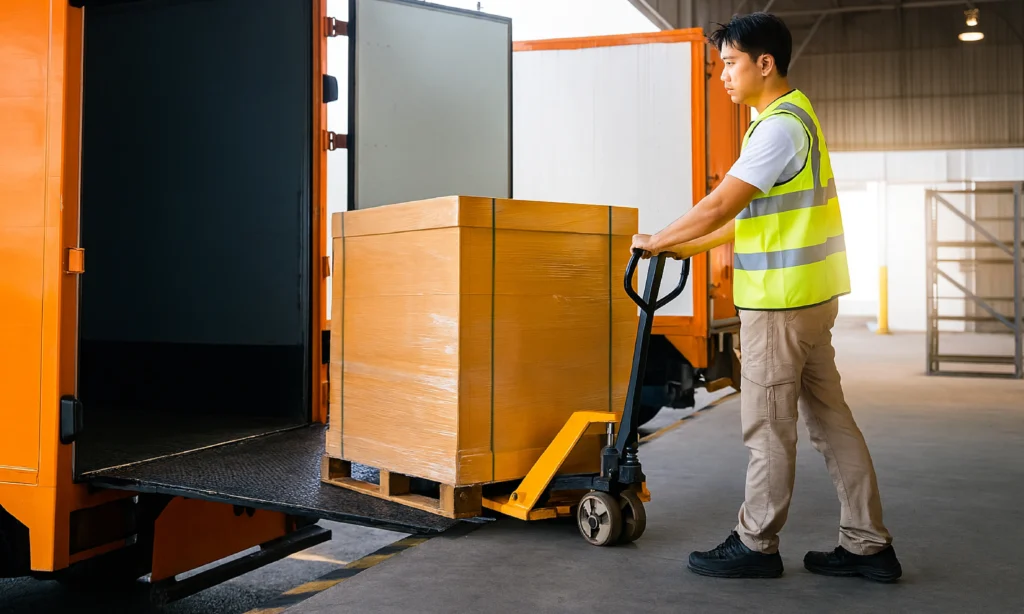Italian economy is supported by the shipping and logistics industry, where the busy ports such as Genoa, Savona, Venice, and Civitavecchia are the main centers of employment. In 2025, the job of shipping and loading laborers is still very popular, and it provides both entry-level and skilled applicants with a good opportunity to enter one of the most active maritime economies in the Mediterranean region. This article gives a comprehensive outline of the work of laborers, their requirements, wages, working conditions, and practical advice to job seekers in the Italian ports.
The Italian Port Sector- An Employment Hot-Spot
The ports of Italy are not only entry points of goods but also flourishing workplaces. The cargo, shipping and warehousing sector, also known as the logistics and maritime sector, is projected to create more than 1.4 million jobs in 2025. Experienced workers play key roles in effective processing, transportation, and shipping of goods in hundreds of port terminals and logistic firms in the country.
Major Ports of Shipping and Loading Work
- Genoa & Savona: The 35 main terminal operators and dozens of logistics companies are home to.
- Venice: Cannot do without it in the Adriatic, provides employment opportunities in the field of logistics as well as passenger support.
- Civitavecchia: an expanding source of seasonal and long-term port work places.
Typical Shipping & Loading Laborer Roles
Most labor work in the Italian ports is still practically and operationally based and can be divided into a number of broad categories:
1. Dock Worker / Port Loader
- Loading and offloading goods in ships, trucks and trains
- Transporting products with the help of forklifts, mechanical shovels, cranes, or conveyor belts
- Warehouse or open yard sorting, stacking and securing of cargo
- Reporting damages, checking of cargo documents and following safety regulations
2. Equipment Operator
- Specialised use of port equipment such as cranes, forklifts and reach stackers
- Carrying out minor repairs, inspection, and reporting of malfunctions
- Help in the complex loading/unloading of dangerous/heavy freight
3. General Laborer / Warehouse Helper
- Handling packages, containers and pallets manually
- Helping in stowage and lashing of cargo
- Port facility cleaning and maintenance
4. Terminal Support & Logistics Staff
- Arranging of the flow of goods within terminals
- Undertaking administrative duties associated with cargo scheduling, inventory and transport bonds
- Helping port logistic teams in planning operations
In-Demand Skills and Core Requirements
The following are the main qualities that are sought by employers in the Italian ports in terms of labor candidates:
- Physical fitness: The capacity to stand long hours, carry heavy weight and work in different weather conditions
- Technical expertise: How to use such machines as forklifts and cranes (certification may be necessary)
- Collaboration: Efficient interaction with other workers of the dock and logistics teams
- Concern on safety: High safety standards and training on how to safely handle loads
- Flexibility: the readiness to work on shifts, nights, weekends, and holidays
- Handling skills and fine details to handle sensitive or risky items
Typical qualifications:
- Prior work in the logistics, warehousing or industrial environment is desirable
- Licenses of particular equipment (forklift license)
- A good manual dexterity and team-work ability
- Low level of education; superior organizational and technical capabilities increase the chance of success
In the Italian ports, foreign labor is essential: by 2025, more than a quarter of new employees in logistics and handling will be immigrants. Most employers are open to hiring an applicant with minimal knowledge of the Italian language and offer on-the-job training to the one with the right attitude and work ethic.
Salary Ranges and Work Conditions
Shipping and loading laborers in the Italian ports receive competitive wages compared to other unskilled labor jobs, and this differs according to experience, competence, and location.
| Role | Monthly Salary (EUR) |
| Entry-level Dock Worker | 1,200 – 1,600 |
| Skilled Equipment Op | 1,600 – 2,200+ |
| Warehouse Helper | 1,100 – 1,500 |
| Terminal Support Staff | 1,300 – 2,000 |
Working conditions:
- Shift-based schedules that are full time
- Work out of doors, and indoors, sometimes in cold, heat, or rain
- Physical activities such as lifting, repetitive work and overtime work sometimes.
- Safety is strictly observed; Personal Protective Equipment (PPE) is necessary at all times
Outlook of Employment and Labour Demand by 2025
Italy In 2025, the transport, warehouse, and logistics industries are expected to boom with almost 100,000 jobs being created in a single summer. More than 30,000 positions are reserved specifically to unskilled handlers and delivery workers, and there are another 24,000 job opportunities in machinery operators and other port workers. This is a good candidate market with approximately 37 percent of positions being regarded as difficult to fill because of labor shortages.
Main demand drivers:
- Increasing traffic of goods (E-commerce and import/export)
- Continued infrastructure upgrading in the large ports
- Low turnover-levels and season fluctuations (particular spring-summer)
- Technological advancements that need technical and manual skills
How to Find and Apply for Port Labor Jobs
Where to look:
- Port authority web-sites (e.g. ports of Genoa, Venice)
- Large job portals and websites of logistic companies
- Domestic job agencies in the port cities
- Large shipping and terminal operators company career pages
- Community referral programs (located mostly in port districts)
Application tips:
- Make a focused, concise CV with listing the manual skills, experience with equipment, and certificates
- Point out that you are a very reliable person, flexible when it comes to shifts, and you have any prior experience in logistics/port work
- Foreign candidates should be on top of the requirements of Italian work permit and visa
- Search on company websites under the section of work with us on entry-level and seasonal hiring
Career advancement and Opportunities
A shipping or loading laborer can advance to such positions as:
- Certified Senior equipment operator/crane driver
- Shift coordinator/team supervisor
- Warehouse manager or technician of terminal logistics
- Fine tuning in dangerous products or refrigerated cargoes handling
Big port operators and container terminals frequently provide training programs and an opportunity of getting a permanent job on the basis of a successful trial or seasonal contract.
Industry Trends and Industry Issues
- Labor shortages: Although automation has reduced the number of labor needed, manual labor is still needed and is difficult to achieve during peak seasons.
- Safety: There are strict standards that are applied to avoid injuries, and the use of PPE is mandatory, and training is continuous.
- Technological change: The introduction of semi-automated systems demands the workers to be flexible and ready to learn new skills.
- Inclusivity: The increased use of foreign workers has led to an increase in the number of employers enhancing language and integration schemes.
Table: At-a-Glance – Port Laborer Jobs in Italian Ports (2025)
| What You’ll Do | Typical Requirements | Starting Salary (EUR/month) | Leading Locations |
| Load/unload cargo | Physical fitness, teamwork, some experience | 1,200 – 1,600 | Genoa, Venice, Rome |
| Operate forklifts/cranes | License/certification, technical skills | 1,600 – 2,200+ | Genoa, Trieste |
| Sort/store cargo, inventory | Attention to detail, manual skills | 1,100 – 1,500 | Naples, Palermo |
| Support logistics operations | Organizational skills, flexibility, Italian basic | 1,300 – 2,000 | Livorno, Taranto |
Tips for Success
- Keep safety-conscious: Take any safety-related briefing and maintain abilities.
- Accept change: Flexibility in time is a plus to employment.
- Be in shape: Being in good health is essential to physical needs.
- Become certified: Crane or forklift certification will increase wages and opportunities.
- Local networking: Lots of positions are filled by referrals or direct applications in ports.
Conclusion
The Italian ports are still an active point of entry into the logistics and maritime profession in 2025 through shipping and loading laborer jobs. These jobs offer a good salary, numerous vacancies, and advancement prospects, and are thus suitable to the diligent and flexible job applicants, both national and international. Safety, teamwork, and upskilling can make you successful in the lively port industry of Italy.



